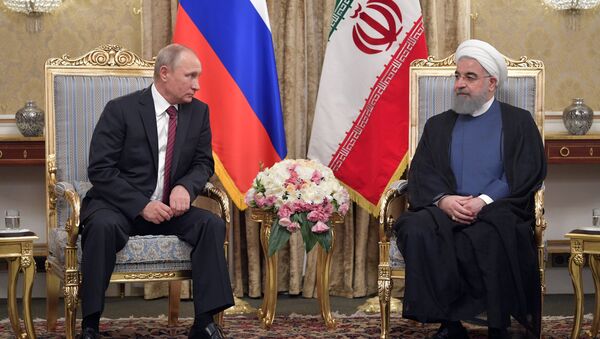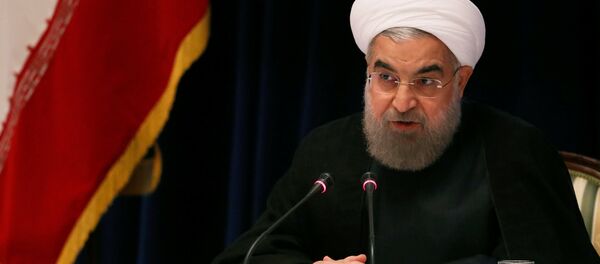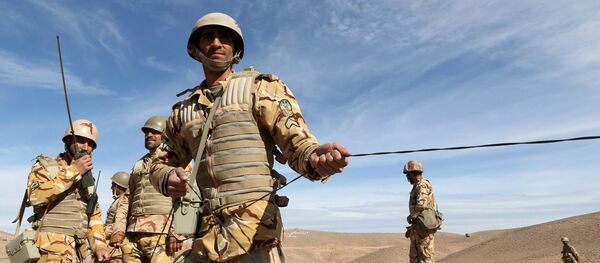Sputnik: Mr. Abdollahian, how do you assess the cooperation between Moscow and Tehran in Syria? What are its results?
Hossein Amir Abdollahian: I think that cooperation on resolving the Syrian crisis was one of the most successful regional interactions between Moscow and Tehran. At the time when the Syrian crisis reached its pinnacle, I worked at the Foreign Ministry and oversaw the Syrian issue.
In the initial stage, we had doubts about the position and participation of Moscow in the Syrian conflict. But President Putin made the right decisions: first, on the fight against terror, secondly, by supporting the legitimate Syrian government and thirdly, by actively taking part in the political process to resolve the conflict.
We continue consultations with Moscow on the most diverse areas of Syria-related cooperation pertaining to diplomatic, political and military and defense fields. There were also negotiations at the highest level.
In particular, Vladimir Putin met with Iran's Supreme Leader to discuss a whole range of bilateral cooperation related to security, support of the legitimate Syrian government, the protection Syrian people from terrorists and regional stability.
READ MORE: Members of Syria Sochi Talks Get Statuettes Symbolizing Friendship With Russia
I believe that this was a very successful experience of interaction between our countries. The Moscow-Tehran-Damascus triangle managed to achieve high-quality cooperation in the frontline and break terrorists' forces. Russia's firm position on a number of issues in the UN Security Council regarding the Syrian crisis was also a significant contribution.
Therefore, I consider the cooperation between Moscow and Teheran in Syria a vivid example of resolution for other Middle East problems, aimed at de-escalating conflicts and stabilizing the situation in the region.
Sputnik: Will Iran add to Syria's reconstruction efforts after the war?
Hossein Amir Abdollahian: During heavy fighting in Syria, Iran provided the most feasible assistance to the country. First, our military advisors arrived in Syria to provide consultative support to the Syrian government army so as to counter terrorists.
Secondly, we suffered significant human losses on the front in the fight against terrorism in Syria. Thirdly, despite the fact that Iran itself was under severe sanctions, it still rendered humanitarian aid to the Syrian people.
I think the time has come when all countries should unite and begin the collective process of restoring structures in Syria. Iran was one of the first countries to start a dialogue on restoring the destroyed cities and facilities in Syria.
This is why we will take possible steps to expand trade and economic cooperation with Syria. It should be noted that the infrastructure of this Arab country has suffered enormous losses.
Due to disastrous policies pursued by the US and its allies, the process of rebuilding Syria requires great efforts and the participation of large countries apart from Iran. The international community should join this process so that Syria can embark on a natural path of its development.
Sputnik: How could you formulate the essence of Iran's policy with regard to the Yemeni crisis? What steps does Tehran take in this direction?
Hossein Amir Abdollahian: I want to emphasize that unlike other countries, including the US, Iran has never pursued a policy of double standards for solving regional crises.
We have always insisted that both the Yemeni, Syrian and Libyan crises should have a political solution. Under no circumstances are we accepting a military solution to disputes and problems. However, other countries, in particular the United States and Saudi Arabia, chose this path further exacerbating the situation.
In particular, in Yemen, Saudi Arabia prodded the legitimate government to resign, creating the crisis of power in the country. Attempts to carry out the same behind-the-scenes play was made with respect to the Lebanese Prime Minister, which created a power vacuum in this country. Unfortunately, the US and Saudi Arabia have played a destructive role in the Middle East.
READ MORE: Iran Reveals 2 Conditions for Restoring 'Good Relations' With Saudi Arabia
As far as the resolution of the Yemen crisis is concerned, Iran insists that this should be an exclusively political path, not a military intervention. I will never forget the time when the two weeks had passed since the beginning of the Saudi Armed Forces' air strikes on Yemen.
I flew to Jeddah in Saudi Arabia to attend a ministerial meeting of the Organization of the Islamic Conference (OIC)'s member states. There I met the new Saudi Foreign Minister, Adel al-Jubeir, to tell him that Riyadh's military operation in Yemen is a big strategic mistake.
He, of course, was angry with this, saying in response that the Yemeni Houthis would be routed in less than 3 weeks. However, it has already been four years since the start of Saudi Arabia's military aggression in Yemen which saw no Riyadh victory. Moreover, some Yemeni tribes for self-defense purposes managed to repel the attacks of the Saudi Armed Forces by launching missiles on the heart of Saudi Arabia, which caused significant destruction.
We have repeatedly said that the Yemeni crisis cannot have a military solution. Therefore, we declare that the war will not resolve the essence of the problem. Yes, at the request of the legitimate government in Syria and Iraq, we sent our military advisers who helped us succeed in the fight against terror and Daesh.
But we did not send our military forces or any weapons to Yemen. In addition, due to the sea, land and air blockade of Yemen by Saudi Arabia, we faced a number of difficulties and problems when sending cargo with humanitarian aid to this country. It was necessary to make enormous efforts in order to deliver this cargo to the needy Yemenis with the help of the UN.
I emphasize once again that we insist exclusively on the political solution to the Yemen crisis, which is based on the negotiations of all the conflicting sides inside Yemen. I believe that sooner or later, Yemen will embark on this path.
But for this to happen, it is also important to stop Saudi Arabia's military aggression in Yemen and open the ways of delivering humanitarian aid to the needy residents of this country. These are the most important measures.
Sputnik: Do you think the Middle East will see the Syrian crisis-like conflict in the foreseeable future?
I think that West Asia is a victim of various crises, because Washington and some of its allies see their profits in two ways: transporting cheap oil from West Asian countries to the West and the United States; Americans do not want to close their arms market in the Middle East, and this, in turn, becomes the continuation of conflicts and wars in the region.
"To fight" Daesh, the United States illegally created its bases in Syria without the legitimate government's permission. In fact, the Americans have not made any effective steps in the fight against Daesh in Syria. This is also the case with Iraq where they conducted very weak selective military operations.
READ MORE: Iran Ready to Support Saudi Arabia in Improving Bilateral Ties
According to the satellites' data and the testimonies of the military observers, Daesh commanders were evacuated by the American forces in the last minutes of their battles with the Syrian or Iraqi government armies. It was the US that prevented Daesh leaders from being killed in Syria and Iraq.
According to intelligence information, these militants were transferred to other countries, in particular to Afghanistan, and in this vein the main question arises on who is to blame for the intensification of terror.
Also, one can doubt Washington's loud and nice slogans on protection of human rights and the fight against terrorism, because the US' practical steps run counter to these slogans and show that Americans do not want to follow them. On the contrary, Americans are aimed at inciting wars and instability in the region to meet their own benefits and interests.
Sputnik: The P5+1 group's member states as well as some other European countries say that they want to adhere to the "spirit" of the Iran nuclear deal, also known as the Joint Comprehensive Plan of Action (JCPOA). In some cases, they want to discuss the issues, including Iran's defense program, that are not related to the JCPOA, identifying them as part of the deal. How do you assess this adherence to the JCPOA's "spirit" by P5+1 members? Is Iran ready for new talks with the West?
Hossein Amir Abdollahian: The reality is that the US has not fulfilled its obligations under the JCPOA. This was to be expected, since such behavior on the part of the US was in place before the 1979 [Iranian] Revolution and subsequent events. Assessing Washington's so-called "adherence" to the JCPOA, the Iranian warned in advance that Americans cannot be trusted.
The US wants the implementation of the JCPOA to meet its regional interests, that is, to turn the deal into a sort of hostage. Therefore, they try to include the issue of Iran's military program in the JCPOA's framework. I should note that in this issue the US has some common interests with Europeans.
READ MORE: US Likely Took Course to Demolish Iran Nuclear Deal — Russia's Deputy FM
But apart from Russia which took big steps to achieve the Iran nuclear deal and uphold the Islamic Republic's interests on further implementation of the signed agreement, the European countries dissatisfied with Trump's policy can also take independent steps towards compliance with the nuclear deal.
Of course, this does not mean that all the Europeans will support US policy on this issue. Someone will remain committed to their initial course — adherence to the JCPOA's "spirit", while others will show solidarity with the United States, which wants to exert pressure [on Iran], citing "the growing hegemony of Iran in the region". Under this pretext, Washington wants to interfere with Iran's missile program, depriving us of the right to fully implement the signed JCPOA.
Sputnik: [US President] Donald Trump said that in 120 days he may decide not to resume the suspended regime of sanctions against Iran, which would jeopardize the nuclear deal. That is, 120 days later, Washington can withdraw from the deal. What will Iran do in this case?
Hossein Amir Abdollahian: A special committee has been established in Iran to monitor compliance with and implementation of the JCPOA. So far, Iran has shown solidarity and restraint. But if Donald Trump delivers on his pre-election promises regarding the break-up of the nuclear deal, then Iran will stick to the words of our Supreme Leader who earlier said that "we will burn this nuclear treaty."
I can say for sure that the committee had considered a variety of scenarios and developed measures that will be taken by Iran in the event of the nuclear deal's collapse endorsed by US efforts. If this happens, the committee's representatives will announce a more detailed plan.
Sputnik: As is known, relations between Iran and Saudi Arabia have yet to reach the desired level, with a big political gap between the countries still in place. Do you think there is a chance for the restoration of healthy diplomatic ties between Tehran and Riyadh? How can this be achieved?
Hossein Amir Abdollahian: First, I must note that this abyss was not created by Iran's efforts. We did not close the way for normalizing relations between Tehran and Riyadh. When I was Deputy Foreign Minister, there was a political crisis in bilateral relations. Unfortunately, the Saudis hastily adopted an absolutely illogical decision: unilaterally severed diplomatic relations, expelling our diplomats from the country.
At the same time, I would like to stress that we did not send an official note on the severance of diplomatic relations to Saudi Arabia. It was a difficult time as we were under pressure from the world community.
We considered that such hasty decisions were made in Saudi Arabia by an inexperienced young man and that we need to give this country a chance to review. That is, we left open the door which we hope Saudi Arabia will enter and return its relationship with Iran back to normal.
The views and opinions expressed by Hossein Amir Abdollahian are those of the speaker and do not necessarily reflect those of Sputnik.





